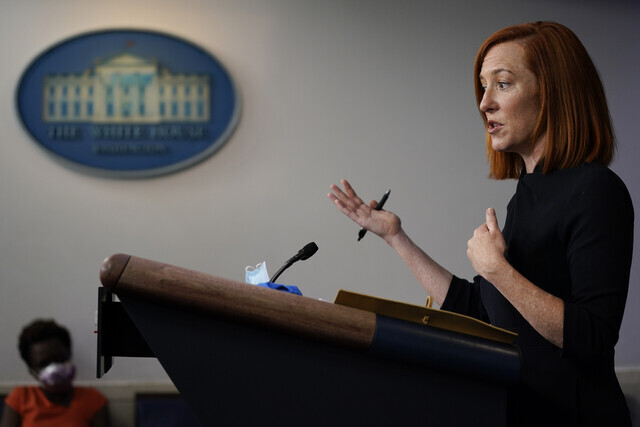[Editorial] S. Korea's role in the US' N. Korea policy just got more important
전체 맥락을 이해하기 위해서는 본문 보기를 권장합니다.
On Jan. 22, White House Press Secretary Jen Psaki said, "[President Joe Biden's] view is, of course, that it is without question that North Korea's nuclear ballistic missile and other [nuclear] proliferation-related activities constitute a serious threat to the international peace and security of the world."
With its emphasis on clearing away the vestiges of the Trump administration, the Biden administration's focus on North Korea policy and working-level talks is a long way from the sort of swift resumption of the Korean Peninsula peace process that Seoul has been envisioning. North Korea has also called for new proposals from the US, announcing at its Workers' Party of Korea (WPK) Congress that it planned to "approach the US on the principle of power for power and goodwill for goodwill."
이 글자크기로 변경됩니다.
(예시) 가장 빠른 뉴스가 있고 다양한 정보, 쌍방향 소통이 숨쉬는 다음뉴스를 만나보세요. 다음뉴스는 국내외 주요이슈와 실시간 속보, 문화생활 및 다양한 분야의 뉴스를 입체적으로 전달하고 있습니다.

The White House has announced plans to work with its allies to develop a “new strategy” on the North Korean nuclear issue.
On Jan. 22, White House Press Secretary Jen Psaki said, “[President Joe Biden’s] view is, of course, that it is without question that North Korea’s nuclear ballistic missile and other [nuclear] proliferation-related activities constitute a serious threat to the international peace and security of the world.”
Psaki also stressed that Washington “still [has] a vital interest in deterring North Korea.”
“We will adopt a new strategy to keep the American people and our allies safe,” she continued, adding that the “approach will begin with a thorough policy review of the state of play in North Korea, in close consultation with South Korea, Japan, and other allies.”
Coming three days after the Biden administration took office, this was the first official statement of its position on North Korea policy. It read as a continuation from Secretary of State-designate Tony Blinken’s remarks in his confirmation hearing last week about reviewing the “entire approach and policy toward North Korea.”
It seems clear that the Biden administration is favoring a bottom-up approach based on working-level negotiations and a multilateral approach of cooperation with allies, rather than the top-down approach the Donald Trump administration adopted with its emphasis on direct negotiations between heads of state. At the same time, the specifics of this “new strategy” have not been finalized. This only underscores the need for the South Korean government to coordinate with the Biden administration.
In that sense, it comes as welcome news that discussions between South Korean and US authorities have gotten off to a swift start. According to the White House, National Security Advisor Jake Sullivan had a 40-minute phone conversation with Blue House Office of National Security Director Suh Hoon on Jan. 23, during which he “stressed the Biden administration’s commitment to further strengthening the US-ROK alliance.”
The South Korean and US defense ministers also spoke over the telephone on Jan. 24, reaffirming the close cooperation between the two sides’ defense authorities.
With its emphasis on clearing away the vestiges of the Trump administration, the Biden administration’s focus on North Korea policy and working-level talks is a long way from the sort of swift resumption of the Korean Peninsula peace process that Seoul has been envisioning. North Korea has also called for new proposals from the US, announcing at its Workers’ Party of Korea (WPK) Congress that it planned to “approach the US on the principle of power for power and goodwill for goodwill.”
There is the chance that we could see a battle of wills between the two sides, which leads to a show of force from North Korea and rising tensions. As a first step, we will need to hurry up and hold discussions on what to do about the South Korea-US joint military exercises currently scheduled for March.
Besides the North Korean nuclear issue, there are also a lot of other matters for South Korea and the US to work out together. We will need to closely analyze and respond to the Biden administration’s Indo-Pacific strategy and its policies on China. The foreign affairs and national security team should make thorough preparations for Presidents Moon Jae-in and Joe Biden to coordinate closely and quickly on matters, both over the telephone and at a summit.
Please direct comments or questions to [english@hani.co.kr]
Copyright © 한겨레신문사 All Rights Reserved. 무단 전재, 재배포, AI 학습 및 활용 금지
- [전문] 장혜영 “왜 그럴듯한 남성조차 여성 존중에 실패하는가”
- 127명 확진 이유 있었다…“한방 20명 생활, 첫 증상에도 자체격리만”
- “자영업자 손실 보상, 3월 지급 목표”…속도 올리는 민주당
- 대전 코로나 집단감염 부른 IM선교회 설립자 ‘마이클 조’ 누구?
- 이재명과 의원들은 왜 ‘텔레방’을 폭파했을까
- 구어체에 열 글자도 훌쩍…요즘 드라마 제목, 왜 구구절절한가요?
- 이재용, 재상고 포기…‘부회장의 취업제한’ 숙제 남은 삼성
- 야권, 사과한 유시민 이사장 압박…“물러나라” “주장 근거 밝히라”
- 중국, 미국 제치고 투자 유치 세계 1위
- [뉴노멀-트렌드] 공부는 어른들에게 더 필요하다 / 김용섭